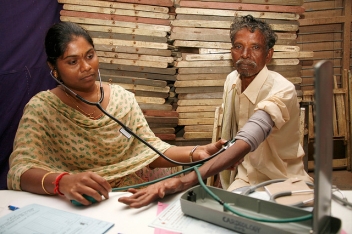 In expanding our work on health, we aim to significantly improve the number of older people receiving good quality health and care services.
In expanding our work on health, we aim to significantly improve the number of older people receiving good quality health and care services.
Rapid global ageing, the increase of non-communicable diseases (strokes, diabetes, cancer, dementia, etc…) in the developing world and the lack of access to healthcare for older people, ramp up the urgency of this issue.
We want to convince governments that older people’s health needs must be met and need investment.
We have many challenges ahead, which is why we are delighted to have Pascale Fritsch as our new Health Adviser, working in the Emergencies department.
Conveniently, she starts working with us on the week of World Health Day. I thought it would be a great opportunity to talk to her about her experience working in public health for over twenty years.
I was also intrigued to find out her thoughts on older people’s health. What does she think about the challenges older people in developing countries face in accessing healthcare and what she will be doing in her new role to address these issues?
Me: “Pascale, can you tell me a bit about your background working in health?”
Pascale: “I’m a qualified Medical doctor but I haven’t practised since the late 80s when I began working in public health.
“Before joining HelpAge, I was working for the French Ministry of Health at a regional level. I was working on programmes which dealt with cancer prevention, screening and care. I was also doing similar work in the mental health field, coordinating mental health groups, as well as working on palliative care and crisis preparedness management.
“Before this I spent a lot of time working as a Health Adviser in humanitarian responses. Some of the agencies I worked for included MSF in Sudan and Uganda and UNICEF in Nigeria and Chad. I was also part of EU funded projects in DRC and Liberia.”
Me: “While you were working in developing countries, was older people’s health something that you looked at?”
Pascale: “When I was working on these projects, older people’s health was not on my mind. Agencies do not give much attention to older people’s health.
“There are some examples of when the issue of older people and health came to me and stayed in my mind though.
“I was in Eritrea, working in a camp for internally displaced people, which was lost in the mountains, surrounded by steep hills. I saw an older woman with two very young children. She was very dignified and told me her story.
“She said that before the civil war she was rich and lived in a big house. Now she said she was living in a tent. Her daughter had gone away and she was bringing up her two children with no support. Her husband had gone to fight and was killed.
“Something else that struck me in Uganda was that there were only older people left. I worked on HIV and AIDS programmes and all you saw were older people taking care of young children. However, older people still weren’t acknowledged as a group to look after, our priority was to ensure that the children were not infected with HIV.”
Me: “Is there anything else that made you think about working on the issue of older people’s health?”
Pascale: “When I was working in France most recently, I started thinking about older people in relation to my work with health. France, like all Western European countries, has an ageing population which the government probably views as an economic burden. That’s when I became sensitised to the issues of older people’s health.
“It made me think that, if developed countries like France were struggling to provide care to older people and countries like the UK already provide healthcare on a priority basis, then where would that leave older people in developing countries?”
Me: “What do you think are the priorities are moving forward with healthcare for older people?”
Pascale: “Access has to be the most important thing. But access means so much and every word is important. Access has to be economic and geographical. Older people also need access to healthcare that is appropriate, of good quality and adapted to their needs. It also has to be ongoing.
“The NCD (non-communicable diseases) conference this year should be really interesting. I’m just afraid that with the economic crisis at the moment, older people won’t be prioritised and it will be difficult to shift agendas to include older people.
“Drugs can be very expensive, which could also be a problem when working on older people’s health.
“Advocacy is also important, we need to create awareness. The same level of care should be provided to everyone regardless of age.“
Me: “What will you be working on in your new role here?”
Pascale: “I’ll be ensuring that health projects for older people are integrated in emergency programmes. We want older people to have access to healthcare as part of all emergency responses.
“It’s clear that older people are not the target group of other agencies. Working with agencies will be interesting, some will be open, some won’t, but many probably haven’t even considered targeting older people. What we really need to do is build on our mutual knowledge.”
Read more about our work on health and emergencies.
